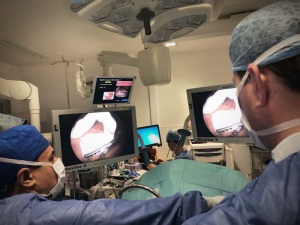by
John R. Fischer, Senior Reporter | July 18, 2018

Digital Surgery has unveiled the
first AI system designed for OR
environments
The first demonstration of a real-time, artificial intelligence-based system for operating room procedures has taken place following its development by surgical technology provider Digital Surgery.
The design of the solution is part of the company’s initiative to map out proprietary surgical procedures to aid surgical teams, reduce risk and make surgery safer by upgrading from current preoperative imaging approaches and technology.
“Whilst imaging has radically evolved, the technologies to display images are basically the same as in the 1950s, on 2D screens that are removed and distant from the patient or the surgical team,” Dr. Jean Nehme, co-founder and CEO of Digital Surgery, told HCB News. “Incorporating better imaging technologies, coupled with better computer power, and making all of this available at the fingertips of healthcare professionals may have a significant impact on patient safety and outcomes.”
More than five billion people have no access to safe surgical care, a circumstance attributed to a lack in scale of surgical knowledge globally. Robotics, telemedicine platforms and other technology alternatives, while useful, require expensive equipment or resources that limit their scalability.
Acting as a navigational system for OR and surgical centers, the AI platform is designed to address a variety of variables that can challenge operations from staff turnover, language, culture, tools, and resources, to training and surgical team skill levels.
The system recognizes actions that take place during surgery through a camera view, cross-checking and correlating anatomy and actions against the largest library of surgical plans mapped out. This enables the OR team to see in real time what the platform analyzes, allowing it to predict the next steps in the procedure.
Nehm says that while promising, the application of AI in surgery is still in its infancy and requires an independent demonstration of its value in surgery and eventually robotic surgery before being fully implemented.
“We have demonstrated that there is a need for artificial intelligence in the operating room to support the coordination of surgical process and ultimately improve patient safety and outcomes,” Nehme said. “A significant amount of work remains to create algorithms to span the breadth of surgery and surgical error. We are excited by this challenge and would welcome tackling this together with the makers of surgical robotics.”
Back to HCB News
